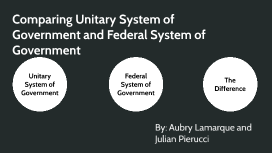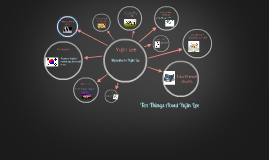Government Comparison Slide
Transcript: Comparing Unitary System of Government and Federal System of Government By: Aubry Lamarque and Julian Pierucci Unitary System of Government Pros Unitary System of Government: Cons A unitary state is an independent nation where all powers belong in the central government. Small islands off the carribean and small countries have a unitary system of government. Countries like Bhutan, Cambodia, The Bahamas, and even France and the Phillipines Lack of Infastructure A centrally controlled government may save money by cutting administrative expenses, but less infrastructure is available for the community to disperse resources as needed. A unitary system's response to a natural disaster is frequently slower than that of other types of government. Infastructure It is a government that can control the financial markets. Control of Financial Decisions Because the government has control over financial decisions. Rich and powerful people have a tendency to support their own futures at the expense of the typical family. Quick Decisions Decisions Because decisions are made by a single governing body, the unitary government is able to respond more quickly to unexpected situations, It Can Be Less Costly Unitary states can run more effectively without the various levels of government typical in federations, potentially lowering their tax load on their citizens. Cost The Size of the Government Can Be Smaller The unitary government may have fewer elected representatives and the ability to rule the entire nation from a single location. A unitary state's smaller structure enables it to serve its citizens' requirements without using a gigantic labor force. Size Federal System of Government Federal System of Government/Federalism Federalism is a form of government where the central/national government shares its power with small regional governments. some examples of federalism are Germany, the United States, and Canada. Positives of federalism Positives A pro of federalism is that the regional government will usually have a better understanding of the issues in thier region which will make it so the quality of living goes up there. Another pro is that it causes less tyranny because the power is less centralized in to one persons or small groups hands. The last pro is that it encourages new laws and policys because each state will go about things differently so any law that is good can be adopted nationaly and they can know when a law is bad. Negatives of federalism Negatives One con of federalism is that there will be more conflict. The federal and national government will be in constant conflict over how much control each government should get Another con is that the federal and national government can deflect the blame to the other government making it harder to see who made the problem. The last con is inequality between states/districts. for example some states will spend more money on education than others causing people to be less educated in some states giving them worse chances. when in a unitary one education is always around the same level What's The Difference? The Difference Power sharing is the biggest difference between federal and unitary governments. Power is seperated between the federal and state governments in these systems of management. There is just one level of government in a unitary form of government, or if subdivisions exist, they will be under the control of the central government. State governments are accountable to the people under the federal system of government, not to the federal government. Local or regional governments must comply with any orders provided by the central government; the central government cannot command state governments to do anything.

















